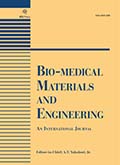Authors: Chang, Jui‐Chung | Oshida, Yoshiki | Gregory, Richard L. | Andres, Carl J. | Barco, Thomas M. | Brown, David T.
Article Type:
Research Article
Abstract:
Microbiology‐related corrosion has been noted in industry for many years. It is widely recognized that microorganisms affect the corrosion of metal and alloys immersed in aqueous environments. Under similar conditions, the effect of bacteria in the oral environment on the corrosion of dental metallic materials remains unknown. The purpose of this study is to investigate the corrosion behavior of dental metallic materials in the presence of Streptococcus mutans and its growth byproducts. Samples were commercially pure titanium (CPT), Ti‐6Al‐4V (TAV), Ti‐Ni (TN), Co‐Cr‐Mo alloy (CCM), 316L stainless steel (SSL), 17Cr‐4Ni PH‐type stainless steel (PH), and Ni‐Cr alloy (NC). Using Gamry
…corrosion test system, surfaces were exposed to (1) sterilized Ringer's solution as a control for (2), (2) S. mutans mixed with sterilized Ringer's solution; (3) sterilized tryptic soy broth as a control for (4), and (4) byproducts of S. mutans mixed with sterilized tryptic soy broth. Corrosion parameters (EOCP , ECORR , ICORR , etc.) were corrected for all tested samples. Averaged values of these parameters were statistically analyzed by t‐test to identify significant differences. It was concluded that (1) S. mutans reduced the EOCP of CPT, TAV, TN, and SSL, and the byproducts of S. mutans reduced the EOCP of TAV, TN, SSL, and PH. (2) S. mutans increased the ICORR of PH, and byproducts of S. mutans increased the ICORR of all the samples. (3) S. mutans reduced the ECORR of CPT, TAV and TN, and the byproducts of S. mutans reduced the ECORR of TN, SSL, PH, and NC. (4) S. mutans increased the IPASS of CPT, and the byproducts of S. mutans increased the IPASS of CPT, PH, and NC.
Show more
Keywords: Bacteria corrosion, microbiology, titanium, passivation, transpassivation
Citation: Bio-Medical Materials and Engineering,
vol. 13, no. 3, pp. 281-295, 2003
Price: EUR 27.50





